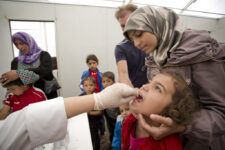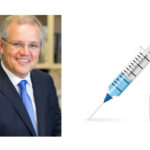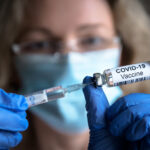Vaccine Apartheid: Morrison Backs Big Pharma in Denying Poorer Nations

As criticism of the Coalition government’s rollout of the COVID-19 vaccine reaches fever pitch in line with the Melbourne lockdown, a lesser-known fact is that Scott Morrison is continuing to side with a small group of richer nations who refuse to permit poorer countries cheap vaccine access.
South Africa and India petitioned the World Trade Organisation last October to pause the intellectual property (IP) rights concerning COVID vaccines, so that cheaper generic versions can be produced to allow people of the Global South to be vaccinated.
Significantly, the US Biden administration has recently thrown its weight behind the initiative.
Indeed, over 120 nations, including China and Russia, are now in support of waiving the 1995 WTO-instated 20 year patent provisions that protect the IP rights of newly-produced vaccines and other medical treatments.
On Wednesday night, a group of US citizens held a vigil at the Australian Embassy in San Francisco, remembering those who’ve died as a result of the virus, as well as calling on Canberra to permit the waiver for the world’s poorest, as without it some may not receive a vaccine until 2023 or later.
The reason nations like ours are holding out is to ensure the profits of pharmaceutical companies. And besides the immediate loss of life this involves, another danger is if inoculation only takes place in certain parts of the globe, the virus may mutate to the point that current vaccines cease to work.
Profit before people
“The pharmaceutical companies are controlling the price and output of vaccines, as well as how much gets produced and who gets it,” said Australian Fair Trade and Investment Network (AFTINET) convenor Dr Patricia Ranald.
“Governments have to negotiate with each pharmaceutical company to settle on a price and how much they can get,” she continued. “The rich countries are the first in queue and they have bought up most of the global supply. Even countries like Australia have had delays.”
So, poorer nations of the Global South simply can’t afford vaccines, which for the most part have already sold out. However, a waiver of the intellectual property rights would permit nations with capabilities, such as India and South Africa, to produce generic versions at an affordable price.
According to Ranald, while “the pandemic is raging” millions of people are dying in low-income countries, while new mutations continue to emerge, and the experts are saying that citizens of the globe’s poorest nations won’t see a vaccine until at least another two years.
“This is a tragedy in itself,” she told Sydney Criminal Lawyers. “But also, it means that globally the pandemic is becoming more dangerous because there are more mutations, which may mean we need new vaccines in the future.”
Cashing in on crisis
The patent system is supposed to provide incentives to pharmaceutical companies to produce new treatments and vaccines, so that developmental expenses are covered by the two decade monopoly on production.
Big Pharma is arguing that the waiver would undermine this system going into the future.
“These arguments don’t hold in this situation,” Dr Ranald stressed. “During the pandemic all of the vaccines have had their development supported by public money, through universities and direct grants to companies.”
“So, it’s not as if they have taken a huge risk in investing money,” she added. “The other thing is they are already making billions through the rollout of the vaccine, and they want to maintain control of the market.”
The AFTINET website sets out that over the course of the pandemic nine founders, chairs and chief executives from various pharmaceutical companies have become billionaires due to vaccine sales, while eight pre-existing Big Pharma billionaires have seen their wealth increase by over $32 billion.
For the WTO waiver on COVID vaccines patents to go ahead, there needs to be a consensus, and currently there’s a few rich nations lobbying against the move. Along with Australia, these include the UK, Germany, Switzerland, Norway, Japan, Brazil and Canada.
Protecting intellectual property
The World Trade Organisation came into being on 1 January 1995. It was established by the 125 nations that were a party to the General Agreement on Tariffs and Trade (GATT), which is a post-WWII agreement to promote trade via the lowering or eliminating of tariffs, quotas and subsidies.
The WTO oversees global trade rules, and its measures are legally binding. Today, it governs three international trade agreements, the GATT, the General Agreement on Trade in Services, and the Trade-Related Aspects of Intellectual Property Rights (TRIPS) agreement.
Coming into effect in 1995, the TRIPS agreement contains provisions that protect intellectual property rights internationally. This includes patents, copyrights, trademarks, trade names and integrated circuit layout-designs. One hundred and sixty four nations are a party to the agreement.
The TRIPS provides minimum IP protections and standards for WTO members. It outlines remedies to undertake in cases where property rights have been undermined, and it contains settlement procedures to allow disputes to be solved.
The politics of treatment
As Dr Ranald points out, the TRIPS came into effect right before the HIV/AIDS crisis struck. And what this meant for nations of the Global South was when the first exorbitantly priced treatments were released, they couldn’t obtain them.
“What Brazil did was produce their own cheaper versions of these drugs. They got hold of the intellectual property and they started producing them,” Dr Ranald explained. “So, some US pharmaceutical companies then tried to take action against Brazil in the WTO.”
This led to a global campaign against the effect the TRIPS was having upon poorer nations. And some amendments were made to the agreement, which permit countries to apply directly to the owner of a patent during a crisis for permission to obtain a compulsory licence to manufacture cheap drugs.
Dr Ranald explained that the emergency provisions haven’t been fruitful during the current pandemic, with South Africa revealing that when it applied for a compulsory licence, a pharmaceutical company placed such extreme stipulations on the deal that it was untenable.
Currently, there is also an IP rights waiver system in place until 2033, which allows the world’s least developed nations – the 48 poorest – to produce their own still patented drugs. This does apply to COVID vaccines, but the issue is these countries don’t have the infrastructure to produce them.
Morrison’s pariah state
The Biden administration coming out in support of the South Africa-India waiver proposal early last month, was an unexpected development, especially from a nation with such a strong pharmaceutical lobby.
As his country was grappling with whether to go back into lockdown, Malaysia’s PM Muhyiddin Yassin welcomed the US president’s support for suspending IP rights for COVID, but he went further in calling for the IP rights system to be dismantled as more pandemics are likely in the future.
An official meeting of the WTO Council for Trade-Related Aspects of Intellectual Property Rights is set to take place on 8 and 9 June, which will be the first time it has met to deliberate on the waiver proposal since the United States came on board.
“It’s clear that at this stage, the Australian government is listening more to the pharmaceutical companies than it is to the waiver proposal,” Dr Ranald concluded. “Normally, Australia would follow the lead of the US. New Zealand has.”
“I know from my years of lobbying in Canberra that the pharmaceutical companies are always there lobbying.”







